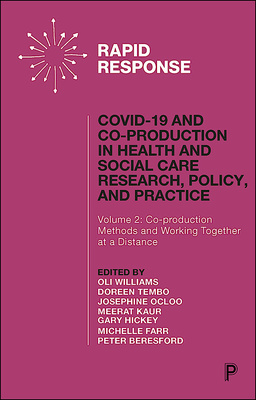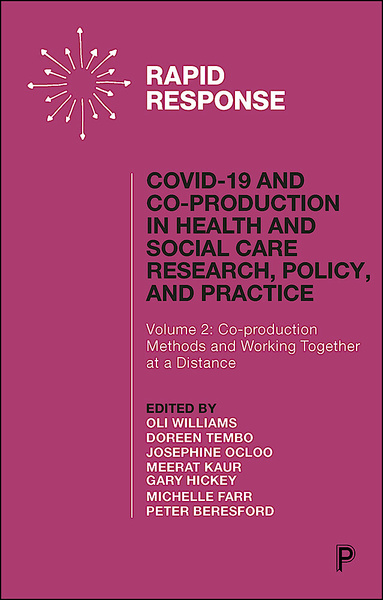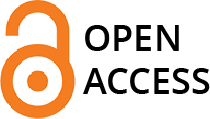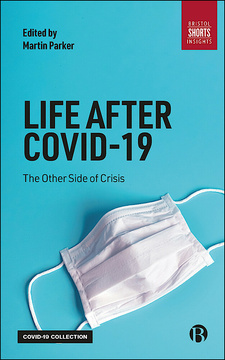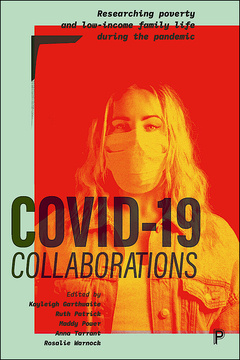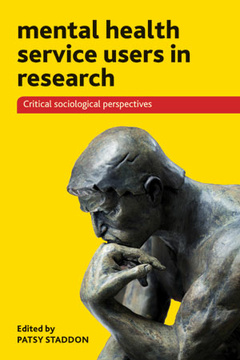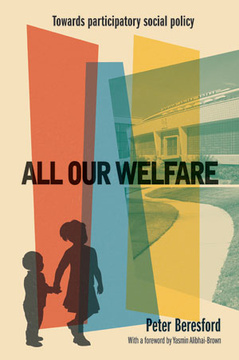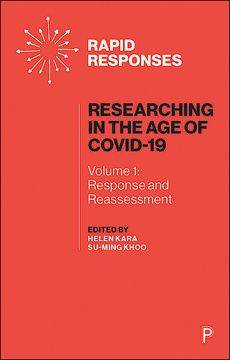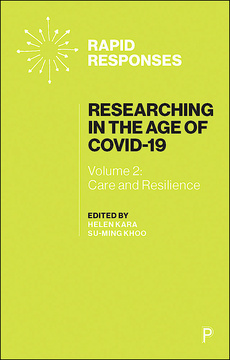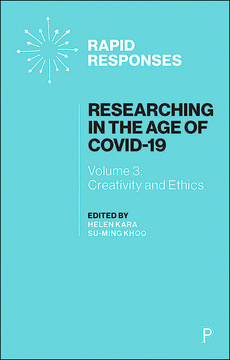COVID-19 and Co-production in Health and Social Care Research, Policy, and Practice
Volume 2: Co-production Methods and Working Together at a Distance
Edited by Oli Williams, Doreen Tembo, Josephine Ocloo, Meerat Kaur, Gary Hickey, Michelle Farr and Peter Beresford
Published
May 24, 2021Page count
160 pagesISBN
978-1447361794Dimensions
Imprint
Policy PressPlease note this title is not available in print. You can browse the digital copy on Bristol University Press Digital.
In the Media
Book launch & Talk: 'Covid-19 and Co-production in Health and Social Care Research'
Co-Production Collective: 'Our Co-produced Book Review is Here'
THIS.Institute: 'COVID-19 and Co-production in Health and Social Care Research, Policy, and Practice'
EPDF and EPUB available Open Access under CC-BY-NC-ND licence. Groups most severely affected by COVID-19 have tended to be those marginalised before the pandemic and are now being largely ignored in developing responses to it.
This two-volume set of Rapid Responses explores the urgent need to put co-production and participatory approaches at the heart of responses to the pandemic and demonstrates how policymakers, health and social care practitioners, patients, service users, carers and public contributors can make this happen.
The second volume focuses on methods and means of co-producing during a pandemic. It explores a variety of case studies from across the global North and South and addresses the practical considerations of co-producing knowledge both now - at a distance - and in the future when the pandemic is over.
Editorial Statement on Editor Order
The order in which editors or authors’ names appear on publications comes with specific assumptions and conventions in academic settings. Specifically, the convention is that the order reflects who had the most influence on the work or who made the greatest contribution or indeed who has the highest status in academia. There was tension between these academic and publishing norms and the participatory and collaborative approaches promoted and practiced by the editors of this collection. These norms can perpetuate the exclusion of those who are already marginalised and largely ignore how structural inequalities render simplistic notions of meritocracy unfit for resolving inequities in academic publishing. Given this context and due to the varied but significant contributions made by all of the editors in this book, and in the spirit of collaborative and equitable ways of working, a pragmatic compromise was made to write the names of the editors alphabetically by surname; A-Z for volume 1 and Z-A for volume 2.
Oli Williams is a Postdoctoral Research Fellow based at King’s College London and funded by the Health Foundation’s grant to the University of Cambridge for The Healthcare Improvement Studies (THIS) Institute.
Doreen Tembo is a Senior Research Manager at the UK National Institute for Health Research (NIHR) Evaluation Trials and Studies Coordinating Centre at the Wessex Institute at the University of Southampton.
Josephine Ocloo is a Senior Researcher and Diversity and Inclusion lead for the National Institute for Health Research (NIHR) Applied Research Collaboration, South London, based at the Centre for Implementation Science (CIS) at King’s College London.
Meerat Kaur is part of the Centre for Engagement and Dissemination at the National Institute for Health Research (NIHR), and an advisor on collaborative approaches for diverse statutory, and community and voluntary organisations.
Gary Hickey is Senior Research Fellow in the Research Design Service South East at the University of Brighton and Senior Public Involvement Manager at the Wessex Institute at the University of Southampton.
Michelle Farr is a Research Fellow at the National Institute for Health Research (NIHR) Applied Research Collaboration West at the University of Bristol.
Peter Beresford, OBE is Visiting Professor at the University of East Anglia, Co-Chair of Shaping our Lives and Emeritus Professor at Brunel University London and Essex University.
Co-production methods and working together at a distance: introduction to volume 2 ~ Oli Williams, Doreen Tembo, Josephine Ocloo, Meerat Kaur, Gary Hickey, Michelle Farr, Peter Beresford [authors listed in reverse alphabetical order]
Section 3: Working together at a distance: guidance and examples
Conversations for Change during COVID-19: Community Voices North West London ~ Meerat Kaur, Sarah Stayt, Janet Wildman, Sharon Tomlin, Chakshu Sharma, Adeola Adeleke, Fatima Elguenuni, Bethany Golding, Phayza Fudlalla, Nafsika Thalassis, Kay Ollivierre, Samira Ben Omar
My Rhodes has no nose: COVID-19 and the two cities of Cape Town ~ Ed Young and Anastasia Koch
Insider-outsider positions during co-production: reflections from the Candomblé terreiros in Brazil ~ Clarice Mota, Leny Trad, and Lisa Dikomitis
Ambitious about co-production: adapting a participation programme during the pandemic to meet the needs of autistic young people ~ Emily Niner and Kerrie Portman
A co-produced response to COVID-19: impact on women and girls with disabilities in low- and middle-income countries ~ Peter O. Ekiikina
#WirVsVirus: communities co-producing new solutions to meet COVID-19 challenges through a hackathon in Germany ~ Elke Loeffler and Claudia Masiga
Locked In or Locked Out: redistributing Power to d/Deaf and Disabled People when using Remote Technologies ~ Adam Goodall and Becki Meakin
Bridging Gaps: how we’ve managed digital exclusion during COVID-19 to improve access to healthcare for women who have experienced trauma ~ The Bridging Gaps group, supported by Michelle Farr, Lesley Wye, Maria Carvalho, Lucy Potter
COVID co-design does not *HAVE* to be digital! Why "which platform should we use?" should not be your first question ~ Joe Langley, Niki Wallace, Aaron Davis, Ian Gwilt, Sarah Knowles, Rebecca Partridge, Gemma Wheeler, Ursula Ankeny
Co-producing virtual co-production: adapting to change ~ Alison Allam, Scott Ballard-Ridley, Katherine Barrett, Lizzie Cain, Cristina Serrao, Niccola Hutchinson-Pascal [authors listed alphabetically]
Co-production and COVID-19: digital diaries as a platform for participating in Covid-19 research ~ Mary Chambers, Dinesh Deokota, Ragil Dien, Nguyen Hoang Yen
Going remote: using technology to co-produce homeless health research ~ PJ Annand, Spike Hudson, Maame Esi D. Yankah, Martin Burrows, Stan Burridge, Michelle Cornes, Sujit D. Rathod, Paniz Hosseini, Lucy Platt, Andy Guise
“A place where we could listen to each other and be heard”: enabling remote participation spaces for research and co-production among disabled people with energy impairment beyond COVID-19 ~ Catherine Hale and Alison Allam
Reflections on Punjabi Communities, COVID-19, and Mental Health ~ Shuranjeet Singh
International perspectives on the impact of COVID-19 on community engagement of young people for involvement in mental health research ~ Rosemary Musesengwa, Vanessa Bennett, Kiran Manku, Biggy Dziro, Sapfo Lignou, Kudzai Kanyere, Peter Lewis
From Utopia Now to Dystopia Now: co-producing knowledge about young people’s hopes and fears for the future ~ Hannah Cowan, Charlotte Kühlbrandt, Hana Riazuddin, Oli Polidore-Perrins, Destiny Boka Batesa, Bella Swinburne
Co-producing during a pandemic and beyond: an afterword for volume 2 ~ Oli Williams, Doreen Tembo, Josephine Ocloo, Meerat Kaur, Gary Hickey, Michelle Farr, Peter Beresford [authors listed in reverse alphabetical order]







